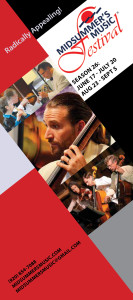 Door County’s Midsummer’s Music Festival is implementing exciting innovations for its 2016 season, with an emphasis on radically appealing concerts.
Door County’s Midsummer’s Music Festival is implementing exciting innovations for its 2016 season, with an emphasis on radically appealing concerts.
For the first time in its 26-year history, Midsummer’s will create a sense of a home-base in 2016. The organization selected Bjorklunden in Baileys Harbor for eight key concerts. Midsummer’s Executive Director Mark Kunstman said, “Bjorklunden has always been a popular spot among our concertgoers. Its central location is equally accessible for people from southern Door to the tip of the peninsula. We’re very excited to have an ‘anchor venue’ that’s so conveniently located.”
Midsummer’s is collaborating with poets from WriteOn Door County to write a poem for each of the Bjorklunden concerts. The poets will create their works from music being performed during the Bjorklunden concerts.
Midsummer’s concerts at Woodwalk Gallery in Egg Harbor are expanding to create a series of four special events. Attendees are invited to bring a picnic and arrive at the gallery starting at 5:00 pm. For two hours, people can enjoy their food and relax with new and old friends while exploring the newly landscaped gardens. At the beginning of each concert, a Woodwalk artist will introduce a piece that was created specifically for the concert, based on music being performed that night.
The entire concert season includes nine unique programs in 33 concerts spanning a seven-week period. As is Midsummer’s tradition, programming aims to incorporate a mix of well-known composers alongside others who are less familiar but justifiably worth knowing for an unforgettable, thoroughly enjoyable experience. Receptions, often with wine and hors d’oeuvres, follow most concerts, where attendees can mix and mingle with new and old friends, as well as the musicians.
The Three Romantic Giants program, featuring Beethoven’s Quintet in E-flat Major, Op. 16, Spohr’s Sechs Deutsche Lieder, Op. 103, and Mendelssohn’s Piano Quartet in B Minor, Op. 3, kicks off the season with the opening night gala at Birch Creek on June 17. Beethoven’s only piano-and-wind Quintet is one of his earlier works and is often said to have been modeled on Mozart’s Quintet, K. 452. Door County mezzo-soprano Cyndy Stiehl joins Midsummer’s ensemble for Spohr’s piece. Mendelssohn completed this piano quartet shortly before his 16th birthday. The program will repeat June 19 at Ephraim Moravian Church, June 24 at the Unitarian Universalist Fellowship, and June 25 at Prince of Peace Church.
The second program, entitled Conradin and Antonin, focuses on classical masters Conradin Kreutzer and Antonín Dvořák. Kreutzer studied under one of Beethoven’s teachers and was highly thought of during his day for his chamber music pieces, including Septet in E-flat Major, Op. 62. When the 34-year-old Dvořák composed the String Quintet in G Major, Op. 77 – his second String Quintet – he was becoming a prominent figure in Prague musical circles. The concerts for this program play June 26 at Woodwalk Gallery, June 28 at Sister Bay Moravian Church, June 29 at Bjorklunden, and June 30 at the Old Gibraltar Town Hall.
A Downton Abbey Concert comprises three English composers from the turn of the twentieth century. Charles Villiers Stanford’s Fantasy No. 1 in G Minor is a serious, big-boned work; yet it has light, transparent textures. Ralph Vaughan Williams’ Piano Quintet in C Minor – which he completed in October 1903, revised it in August 1904 and again in September 1905 – has the same instrumentation as Schubert’s “Trout” Quintet and is reminiscent of Brahms. The Piano Quintet in A Minor, Op. 84, by Edward Elgar is big chamber music that was influenced by the quiet and peaceful surroundings in Sussex, England, during the summer of 1918. The first of the three concerts will be July 1 at the Unitarian Universalist Fellowship and includes a Downton Abbey Affair theme, where attendees are invited to dress in their finest Edwardian, World War I, and Roaring 20’s outfits. The concert will play again on July 2 at Bjorklunden and July 5 at St. Luke’s Episcopal Church.
The two composers featured in the Flair and Passion program are Anton Reicha and the well-known Franz Schubert. Reicha’s musical craftsmanship is evident through his Quintet in F Major, Op. 107. Schubert’s final chamber work, the String Quintet in D Major, D.956, Op. 163, is sometimes called the “Cello Quintet” and was completed just two months before his death. The program premiers July 6 at Bjorklunden and then repeats July 8 at a home concert, July 9 at The Clearing Folk School, and July 10 at Woodwalk Gallery.
Composers Hugo Wolf, Franz Danzi, Franz Schubert and Beethoven are featured in the From Light to Serious program. Wolf’s “Italian Serenade” in G Minor is said to be based on an old Italian melody with a lively, optimistic manner evocative off the Italianate spirit. The Flute Quartet in D Minor, Op. 56, by Danzi, has been described as “light classical,” and quite enjoyable. The Quartettsatz in C Minor, D 703, by Franz Schubert is interestingly the first movement of a string quartet that he never completed. Beethoven’s String Quartet in F Minor, Op. 95, is one of the shortest and most compact of all of his quartets and is referred to as “Serioso” for the tempo designation of the third movement. The program begins July 12 as a home concert, followed by July 16 at Bjorklunden, July 17 at Woodwalk Gallery, and July 19 at another home concert.
Midsummer’s Romantic Connection program focuses on quintets from two composers: Thomas Dunhill and Robert Schumann. Dunhill’s Quintet in E-flat Major, Op. 3, was composed in 1898 as the result of a competition for a cash prize, and it was dedicated to Charles Villiers Stanford from our Downton Abbey Concert program. Noted for its extroverted, exuberant character, Schumann’s Piano Quintet in E-flat Major, Op. 44, is considered one of his finest compositions and a major work of nineteenth-century chamber music. The first Romantic Connections concert is July 14 at East High School in Green Bay and serves as a fundraiser for the school’s fine arts programs. Concerts continue July 15 at the Unitarian Universalist Fellowship, July 20 at Bjorklunden, and July 23 at Prince of Peace Church.
The Labor Day Series of concerts begins with the French Inflections program consisting of three piano trios written by French composers Charles-Édouard Lefebvre, Maurice Ravel and Édouard Lalo. Ballade, by Lefebvre, unites flute, cello and piano in a fairly short piece that exemplifies the Romantic movement. Ravel, who is most known for Boléro, wrote his Basque-inspired Piano Trio in A Minor in five weeks – rather than the typical five months – so that he could enlist in the Army for World War I. Lalo’s piece, Piano Trio No. 3, Op. 26, is among the first works considered uniquely French-sounding instrumental music. Performances begin August 23 with a home concert, followed by August 24 at Bjorklunden, August 25 at St. Luke’s Episcopal Church, and August 31 at Birch Creek.
The season continues with the Heartfelt Sentiments program. Moritz Moszkowski’s Suite in G Minor, Op. 71, is considered a brilliant tour de force and a sure audience pleaser. Contemporary composer Paul Schoenfield’s Trio on Chassidic Melodies is an ingenious blend of artistic ensemble, instrumental virtuosity, and deliberately fragmented references to melodies that might well have been heard at various Hassidic courts in Europe. Well-known Richard Strauss’ Piano Quartet in C Minor, Op. 13, is a work on a big scale and structurally strong, with the first movement in particular demonstrating a dramatic grasp of symphonic tension. Performances are August 27 at Bjorklunden, August 28 at Woodwalk Gallery, August 30 at a home concert, and September 3 at The Clearing Folk School.
The final program of the 2016 season is The Kahn-Brahms Connection. Serenade in F Minor, Op. 73, was published in 1923 by Robert Kahn and is heavily influenced by Brahms. Arthur Foote, a composer from Massachusetts who is considered the first important American composer trained entirely in America, wrote the Piano Quintet, Op. 38. Johannes Brahms’ Piano Quartet No. 2 in A Minor, Op. 26, is a testament to the composer’s love of Schubert‘s music and Vienna. The first performance is September 2 at Prince of Peace Church, followed by September 4 at the Unitarian Universalist Fellowship, and September 5 at a special joint benefit with the Door County Land Trust at Bjorklunden.
Midsummer’s Music Festival was co-founded in 1990 by Jim and Jean Berkenstock, long-time Door County summer residents and principal orchestral players with the Lyric Opera of Chicago. The Festival has drawn on the extraordinary talent of professional musicians and artist/faculty of universities throughout the Midwest.
Offering chamber music for winds, strings, and piano performed in intimate and unique settings throughout Door County, venues include art galleries, churches, and private homes. From the masters such as Mozart, Schubert, and Dvořák to some lesser-known but very accomplished composers, each concert is an unforgettable musical experience.
